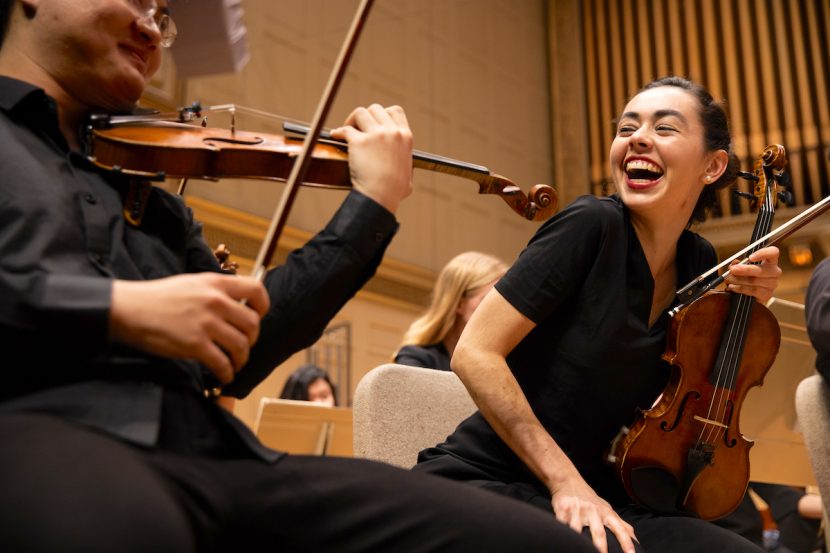by Haley Zaremba
A minor in music can be an excellent option for prospective students who are caught between pursuing their passion for music vs. another path. It’s also a great alternative for multi-talented students who want to focus on an area outside of music without leaving music behind.
Pursuing a minor in music allows for a good balance of interests with a manageable course load when compared to double majoring in music with another area of study.
“I always try to counsel students that they have so many different options for music study,” says Zach Schwartz, Director of Admissions at Boston University School of Music. “Sometimes we tend to only think of full music majors as the only path, but in reality programs such as a music minor can be a perfect choice for someone to maintain their high-level involvement in the arts while also pursuing their chosen academic field of study.”
Why choose a minor in music?
Pursuing a music minor offers some key advantages over simply taking music-related electives or extracurricular music lessons.
First, a more structured music education can be a strong feature on a résumé or curriculum. It reflects a well-rounded, motivated student. Derrick Horne, Professor of Practice in Music at Southern Methodist University’s Meadows School of the Arts, explains that “music minor completion shows dedication to the details of music. It also shows prospective employers that the student is familiar with the rigors of musicianship.”
Second, for students who already have a strong background in music and want to continue to hone their proficiency, minoring in music will keep students’ skills sharp and help maintain momentum and motivation while their primary studies are in another field.
Third, minoring in music ensures that students will be able to register for the music classes that interest them, which may not be the case for students vying for open registration. “A music minor allows students to follow the university music curriculum and enhance their private study with music coursework,” says Anna Luebke, at the University of Maryland School of Music. “Elective lessons that are not related to a major or minor at UMD are limited by space, and the minor program provides better access to music coursework.”
How to pursue a music minor
The process for enrolling in a music minor program varies among schools. Schools may offer a minor in music performance or a more general music minor without a performance focus. These options may have different requirements, workloads, and application/audition processes. For example, participation in ensembles may be required for music performance minors, but not for students minoring in music with a focus on songwriting or music industry practices. In addition, many music performance minors require the same type of audition process as they would for a music major.
At Loyola Marymount University’s Department of Music, prospective music minors audition by performing two pieces/songs in contrasting styles to demonstrate their musical ability. “Previous experience in private instrumental or vocal lessons, and a background in basic musicianship, especially the ability to read music in both treble and bass clefs, are highly desirable,” says LMU’s Senior Administrative & Production Coordinator Tashi Cardinali Bateman.
The number of credits and semesters needed to complete a music minor also varies from school to school. Since a minor requires fewer credits than a major, students generally do not need to declare their music minor in their school applications process or even in their first year(s) of study. However, students should consider declaring (and applying for, depending on program requirements) their music minor in sophomore year to ensure that they have time to complete the program requirements within four years of study.
Program requirements may include classes such as music theory, music history, aural skills, musicology and ethnomusicology, digital music production, recording, mixing, and songwriting. Performance minors will also take classes such as studio, ensemble, and applied lessons. In many programs, applied (private) lessons are often offered with doctoral performance students, and may incur an additional fee.
What can you do with a minor in music?
While many graduates with a minor in music go on to pursue their main area of study as a primary career, some leverage their minors into a career in the music industry, ranging from performance to working in music publishing houses.
For graduates who do not pursue careers in music, their music minors are still useful. A music minor can complement a student’s main area of study and non-musical career path, preparing them for professional success in practical terms, not just on their résumé. Studying music provides transferable skills that can enhance students’ broader marketable skills in addition to their confidence, self-motivation, and teamworking abilities. Furthermore, a minor in music grants students additional knowledge that can be applied to any number of fields by making students more dynamic thinkers and better communicators.
In addition to being helpful in any career, a minor in music can also be fundamental to a college graduate’s ongoing satisfaction and happiness as they enter professional life. These alums leave school as better musicians than when they came in, keeping music central to their lives and allowing them to pursue musical hobbies or side jobs that can keep their lives enriched, balanced, and holistic.
Haley Zaremba is a writer and researcher and frequent contributor to MajoringInMusic.com, with an MFA in Food Studies from American University of Rome and a BA in Media Studies from University of San Francisco. Her writing ranges from music and culture to energy and the environment.
Photo credit: Boston University School of Music



Leave a Reply